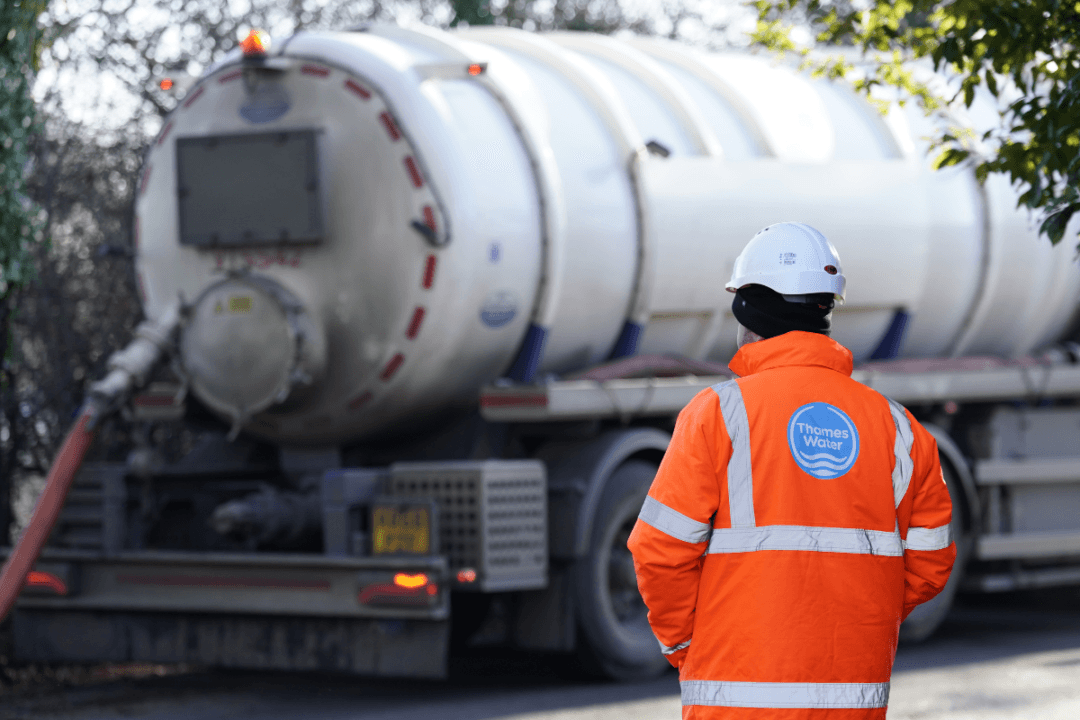Regulators have put debt-ridden Thames Water into special measures and have rejected the company’s request to increase consumers’ water bills by 44 percent over the next five years.
Ofwat said that given concerns about the performance of Thames Water, it would impose a “Turnaround Oversight Regime,” which would include requirements for the utility company to provide a “delivery action plan” setting out proposals on improving its performance on dealing with leaks and sewage spills.
According to the draft verdict published on Thursday, the company will also have to provide a “financial resilience plan,” with the regulator saying it would continue to monitor the company’s financial status. Ofwat may appoint an independent monitor to report on its progress.
The regular also rejected Thames Water’s request to increase consumer bills by 44 percent—£191—by 2030, instead proposing they raise charges by 23 percent—£99—over the period. This would see average bills go up from £436 a year in 2024–25 to £535 in 2029–30.
A spokesperson for Thames Water said Ofwat’s draft ruling “challenges us on efficiency and delivery,” and that it would be considering the regulator’s proposals.
Pollution Scandal
In recent years, the UK has experienced a nationwide pollution scandal, with water companies being exposed for their poor environmental standards, including Thames Water, which was found to have pumped raw sewage into waterways.In England last year, sewage spills into rivers and seas more than doubled. According to the Environment Agency, there were 3.6 million hours of spills in 2023 compared to 1.75 million hours the year before.
Following the publication of Ofwat’s ruling, Environment Secretary Steve Reed said he had written to Ofwat to ask it makes sure water companies’ funding for vital infrastructure investment is ringfenced so that it can only be spent on upgrades that benefit customers and the environment.
“This unacceptable destruction of our waterways should never have been allowed, but change has now begun so it can never happen again,” said Mr. Reed.
Ofwat published plans for the 15 other water companies across England and Wales, which it said would sustain “improvement to customer service and the environment at a fair price for customers.”
The regulator’s Chief Executive David Black said in a statement: “These proposals aim to deliver a 44% reduction in spills from storm overflows compared to levels in 2021. We expect all companies to embrace innovation and go further and faster to reduce spills wherever possible.”
“Let me be very clear to water companies – we will be closely scrutinising the delivery of their plans and will hold them to account to deliver real improvements to the environment and for customers and on their investment programmes,” Mr. Black added.

Rising Water Bills
Thames Water was not the only company to have secured permission to raise water charges in the next five years, albeit at less than it had requested.Under the draft proposals, Ofwat agreed that water bills in England and Wales could increase by an average of £19 a year over the next five years, which is one-third less than the increase utility firms had requested. For example, Severn Trent’s proposed rise of £144 to 2030 was cut to £93.
There is considerable variation between the price rises across the country. Southern Water has been granted an increase of £183 over five years, while Yorkshire Water customers will pay £107 more. Customers of Affinity—which supplies some outer areas of London and parts of the home counties—will see just an £11 rise.
SES—which covers parts of Surrey, Kent, and south London—will actually be saving their customers some money, with bills expected to fall by an average of £34 on the previous five years.
Chancellor of the Exchequer Rachel Reeves described the average 21 percent increase in water bills as a “bitter pill” for customers amid the sewage and water management issues.
Ms. Reeves said the new Labour government would “get a grip” on the water sector, saying, “It’s clearly a bitter pill for people who are seeing today’s announcements about higher water bills.”
“This reflects 14 years of failure from the Conservatives to drive investment to reduce pollution, and to ensure that families are not struggling the way that they have been with the cost-of-living crisis,” she added.







